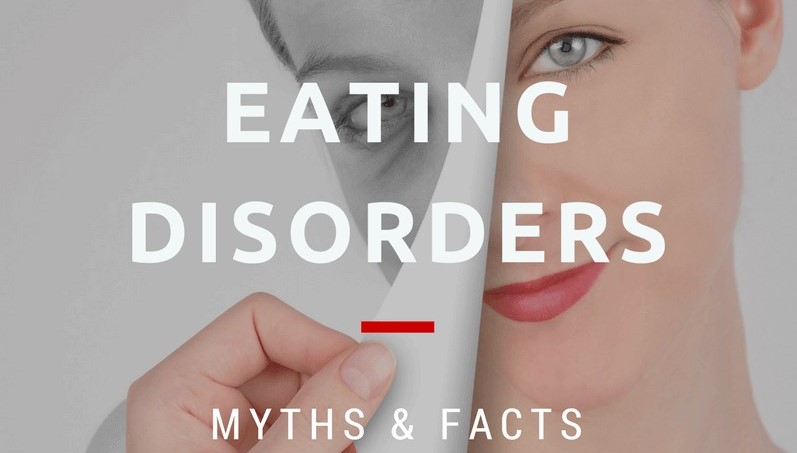“She doesn’t look like she has an eating disorder.” How often have we heard this? Eating disorders are misunderstood and there are certain stigmas that come to mind when you think of someone who has an eating disorder. Here are some just to name a few…
“All people with an eating disorder are underweight.”
Myth: I don’t know how many times I have heard, “Well… she doesn’t look like she has an eating disorder”. What does that even mean? Translation: Your distress is not “real” unless you look the part. The word “all” should have told you it was a myth right there. Yes, some individuals are severely underweight, but the majority are actually at a normal weight and/or overweight. That being said, weight is not the only indicator for determining diagnosis or health status, as we know that people can be at a normal, healthy weight and still be malnourished.
“People with eating disorders are so vain.”
Myth: Eating disorders are about much more than just “weight and appearance”. This mental illness is so complex it could not possible by summarized in one post. It is not what is shown on television as the “rich, blonde, popular cheerleader who wants to lose weight so she can fit into her prom dress.” Eating disorders do not discriminate.
Individuals with anorexia, between the ages of 15-24, have 10 times the risk of dying compared to their peers. The statistics staggering. I want to change that statistic, but first, we need to increase the awareness and acceptance of individuals suffering from this mental health issue. Help us be that change.
“Eating Disorders are a choice.”
Myth: People do not choose nor want to have an eating disorder. Research has shown that genetics is a major component when developing an eating disorder. People who have a family member who has had an eating disorder are 7-10 times more likely to develop one themselves. That being said, it does not mean you will develop one if a family member has suffered from an ED in the past the environment you are in also plays a part.
How do we stop misconceptions about eating disorders withing our own families?
Love your body and portray that to those around you, especially children. Children internalize beliefs and attitudes about themselves from an early age, much of which is attributed to parents beliefs and attitudes about themselves. If a child is hearing their mother or father complain about weight, size, or shape, the child then believes that they too need to worry about their own outward appearance. According to the National Eating Disorder Association, 40-60% of elementary school girls, aged 6-12, are concerned about their weight and body image. This concern continues throughout life, especially when young girls and boys begin puberty.
Now imagine, or perhaps you have experienced this, your mother and/or father often speaking negatively about their own body, weight, size, or even your own. What does this tell you? It tells young women and men that their body needs to look a certain way in order to be happy, respected, well-liked, and thus his or her own self-worth.
Eating disorder or not, we all have body image issues of some sort. How we deal with these issues can make all the difference in your own life and your child or future children life. We need to stop the train and model healthy behaviors and attitudes about weight. This begins at a very early age.
Tips to help build positive self-esteem for your child:
- Avoid negative comments on your own outward appearance.
- Avoid “diet talk” in front of your child. It is ok to want to lose weight, live a healthier lifestyle, or work out! It becomes harmful when the focus is just on weight and appearance and making the food the culprit for body-image issues.
- Incorporate “healthy food and exercise talk”.
- Avoid saying “I can’t eat that. It will make me fat” as it teaches children that being “fat” makes you unlikable thus, that food will make me unlikable.
- Change the conversation from “I (or we) need to go on a walk to burn off those calories” to “Want to go on a walk? It’s nice outside.”
- Make exercise more about how it gives you energy and makes you feel good instead of a task to burn calories and look a certain way.
- Avoid comments about others weight, shape, or size, if it is losing weight or gaining weight.
- “You look great, did you lose weight?” can tell children that losing weight or being “skinny” makes you “look great” and again more likable.
- In addition, it is not helpful to comment when someone has gained weight, even if it is coming from a loving place. Most times than not, people know when they have “gained weight” — you don’t have to tell them! I find this more when young adults go to college and parents are concerned with their eating and exercise habits.
- Stop body comparing.
- Practice self-acceptance. This is a hard one that takes time, but is more than worth the effort!
You are allowed to feel however you feel about your body! Talk to someone who can support you to be your best self when having self-doubt and/or body image issues that are causing distress. Talk to a therapist, dietitian, or a supportive friend/family member who can offer to understand. If you or someone you love is suffering from an eating disorder, disordered eating, and/or body image concerns contact Eating Disorder Solutions for a free consultation.
Carolyn Sherwin @ Eating Disorder Solutions



